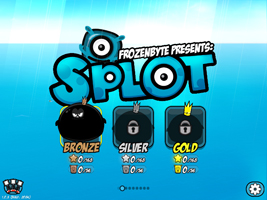

Splot
developed by Frozenbyte (Helsinki, Finland)
first published October 23, 2014, for iOS, $3.99
[trailer 1, trailer 2]
[website]
~630 MB
Played to completion of “bronze” mode (and exhaustive completion of “Farm” level) in 1 hour, 2/27/15—2/28/15.
The first of two bonus not-quite-games in the “Humble Frozenbyte Bundle” as included within the “Humble Frozen Synapse Bundle” that I bought on September 30, 2011.
At the time, this was called a “preorder” of a game still in development, the implication being that the finished game would be showing up for Windows, Mac, and Linux alike within a matter of months, at which time I would own it. Until then, I could download and play a work-in-progress version. I never did; here’s video of what it apparently looked like.
The finished game, however, did not show up any time soon. Frozenbyte proceeded to work on Splot for three more years, during which time it metamorphosed from being a Trine-like physics platforming game to being a cute-bomb iPhone ka-ching-ka-ching game. These things happen.
Despite no longer having any intention of releasing the game for anything but iOS, they were nonetheless obligated to honor the hundreds of thousands of computer “preorders” sold three years earlier, so they very quietly made a Windows version available to Humble Bundle purchasers, identifying it as a “beta.” As far as I can tell, it is completely identical to the finished iPhone version, and is called “beta” only because they want to be clear that they know it’s not a viable product in this form. “Hey guys, we’re giving this to you only as a way of nominally keeping our promise, which we should never have made. Just please understand: it’s no fun. Nobody wants to sit at a computer with a mouse and play a ka-ching-ka-ching iPhone touchscreen game.”
But I did, for an hour. Because I swore I would. Wait, did I swear I would? Actually I think I didn’t swear anything. So maybe this was unnecessary.
Dammit. I always screw up free will. I get it backwards a lot. Oh, FREE will! Gotcha, gotcha. Okay, next time for sure.
The biggest difference between an iPhone game and a computer game is a difference in the level of attention to self. (I’m using “iPhone” like “Kleenex,” as a generic. “Smartphone” is stupid.)
An iPhone game is usually designed for people who are hoping to take some of the edge (which is to say some of the substance) off of being alive and conscious. This is what “casual game” really means; “casual” as opposed to “present and aware.” If you don’t want to play a game “for real,” you just want to play “casually,” what you’re saying is that the game is valuable to you primarily as something to water down your awareness of your actual concerns, even as they remain your actual concerns. It’s negative space to help keep the positive space from taking over.
It probably sounds like I’m knocking that. I’m not at all! I’m just saying that a game that functions as cultural/cognitive negative space is different from one that functions as positive space. A game like Machinarium is decidedly “figure” where Splot is more or less “ground.”
In a bigger-picture sense, maybe I am knocking it a little. It’s much healthier to completely detach from stress, by committing yourself positively to a fantasy, than it is to stay plugged into the stress but flood your mind with jangly “distraction” to temporarily numb the pain.
I guess technically Splot is a platforming/racing game, but that’s incidental. It’s really just pure reward-stimulus nonsense. Jonathan Blow (the guy who made Braid) has been saying for a while now that all the standard ka-ching-ka-ching game mechanics are “Skinnerian” and should be seen as bad for humanity. That’s a noble position to take and one that has made an impression on me — though I’m a bit more ambivalent about the ethical status of such things, for consumer and purveyor alike.
Splot is definitely such things. Achievements, upgrades, puzzle pieces, collectible skins, and the constant blup blup blup of pellet-devouring: the works! Do essentially nothing and be continuously rewarded. But is that so bad? That’s the heart of a healthy childhood, after all: you are good and things are happening! Up on the refrigerator with your latest! Why shouldn’t I, as an adult, be able to get some of that kind of warmly inclusive encouragement? And why not from Splot?
In theory that sounds fine. But in practice, the manifest valuelessness of the “achievements” is dispiriting, at least to me. One can scroll down and see that there are hundreds of them, enough to be doled out steadily for hours and hours and hours, and many of them don’t correspond to things that could ever possibly be experienced with real pride. “Played for 10 minutes! +50XP!” One wants to feel achievement, even if ever so faintly, in the moment that one is being praised for next to nothing. All games are false achievements, after all, but we want to fall for it in good faith, not just by dulling ourselves and listening for the ka-ching.
Playing this game at my computer felt like having a dream of being a researcher watching video of myself sleeping and having that dream. “Yes, I do sometimes will myself into hypnotic submission to this kind of thing and I suppose I’m in that state right now… but I’m also aware of visiting it from the outside, wondering what I think of it.” The state does not itself have thoughts about itself. Ka-ching! Ka-ching!
This is the first game in my current gaming streak that belongs to the happy cutesy-poo Miyamoto school. I approve of such stuff, at least at face value. In fact it cheers me that it’s so ubiquitous. It’s good that this kind of clean, sunlit imagination space is in wide circulation, good that the common culture has room for this set of clean, sunlit archetypes: stories of easily saving the baby chicks from being eaten by the buffoonish blob villain who huffs and puffs each time he’s bested again. Silly rabbit. It’s good that we all still know what this is and don’t have to fight for it: it’s right here.
But I had to qualify that with “at least at face value,” because it doesn’t feel like it’s content to just be itself; it doth protest too much. Such things so often doth. There’s almost always something oversold about cuteitude that makes me feel sad, because it suggests that they don’t really believe in it. Things like Bubble Bobble and Hello Kitty tend to make me feel sad for Japanese people. Why not real, lived innocence? Am I the only one who feels this as full of suppressed pathos? It’s always given me this urge to cry out “it doesn’t have to be this way!”
Now a digression about a different game.
I played a game a few years ago (from a later Humble Bundle) called Little Inferno, which is essentially a satire of all such mind-numbing nonsense as described above (catalogs! upgrades! achievements!). The game of Little Inferno is: there’s a fireplace on screen, you light things on fire in it, and when they’re all burned up, some money comes out, and then you buy more things and light them on fire. That’s pretty much it — done up with a ridiculous array of catalogs! upgrades! achievements! unlocks! It’s obviously a critique, and while I was playing it felt sort of like hypocritical and sour one at that, since after all it is this game, and you are playing it.
But then at the end, after a couple hours of such gameplay, there’s a surprise. Spoilers follow! Eventually, you manage to burn down the whole house, and, in a sort of “allegory of the cave” moment, we suddenly see the person we’ve been “playing as” all this time, a stunned-looking little guy, who stumbles out into the creepy, snowy, empty, Tim Burton-y world around him that he’s been ignoring. He makes his way to the headquarters of the Big Company that sells the fireplaces and issues the catalogs and has been managing this whole mind-numbing, time-wasting endeavor, and then heads up to the top floor to meet the mastermind behind it. Here’s where the commentary becomes interesting. All along, the face of the company has been presented as this tremendously cheerful and bubbly woman, “Miss Nancy.” Then at the end, when you finally see who’s really been in charge all along… Surprise!! There is no conspiracy: it’s just Miss Nancy in the flesh, exactly as depicted, completely sincere and tremendously cheerful. She tells you she hopes you loved your fireplace, and she also hopes you explore the world and enjoy everything there is to enjoy in life. She blasts off in a rocketship to further adventures, and the game ends with your character heading off in a balloon to see the world — snowy and empty though it may be.
I took this to mean: yes, it’s generally better to turn away from such mindless things as this game and open yourself up to the world, but the things themselves aren’t inherently bad, nor are the people who offer them up. They are trying to make the world a better place by making things for people! There is no enemy; there is no error. Little Inferno, in my reading, ended by saying, “Yes, it turns out this game was a legitimate way of spending your time; so are other games; so is everything! It’s up to you to decide how to live!” I appreciated that, and it felt like a meaningful twist at the end of what had seemed to be a bitter satire: the transcendence of of the satirical impulse.
(That said, I still have pretty mixed feelings about Little Inferno as a whole — exactly because I’m glad I saw the ending, in fact! If I completely regretted the whole experience, it would be easy to recognize that it was, after all, my free choice to play it, as per the game’s message. But I’m actually glad I played it, which becomes the framework for being annoyed with it for spending so much time deliberately wasting my time.)
Anyway, that’s basically the attitude I take toward all this ka-ching-ka-ching stuff. Just because it has the potential to be addictive doesn’t make it evil. It is what it is and we’re all free to enjoy it if we can; it’s up to us to know the world and know ourselves.
Knowing ourselves is hard, but that’s not Splot‘s fault!
Interesting to consider this as the output of the same small office space in Helsinki as Shadowgrounds and Trine. While they might well share technical components, they don’t seem to have vision in common — in fact I’d say what they share is a reluctance to engage with the problem of having vision at all. Each one is really just an archetypal exercise. I think that’s the biggest thing keeping videogames from getting truly mature as an artform: the overwhelming predominance of archetypal thinking over humanist thinking. I already said it here seven years ago, but apparently I have to say it again, because has anyone done anything about it?
I had a bunch of notes for other things to write about but I don’t need to. It’s just Splot and I’m tired.
The credits are just a list of names. I can’t even tell who wrote the music.
Tero Rickström, Lauri Hyvärinen, Antti Alkkiomäki, Teemu Laine, Sami Martiskainen, Sauli Lehtinen, Alexei Alander, Samuli Raivio, Tuukka Pensala
And then more.